Mother Nature kept the spigot running this soggy May, but the gray sky and drizzle didn't keep commencement ceremonies from proceeding mostly according to plan at the University of Colorado Anschutz Medical Campus on Friday. All of the schools and colleges held their ceremonies outside, except the School of Medicine, which moved to the Crowne Plaza Hotel DIA.
An abbreviated CU Anschutz main ceremony kicked festivities off at 8:30 a.m. in Boettcher Commons, followed by commencements for the College of Nursing, Graduate School, Physical Therapy, School of Dental Medicine, School of Medicine and Skaggs School of Pharmacy and Pharmaceutical Sciences. More than 1,000 students walked to the podium to receive their degrees.
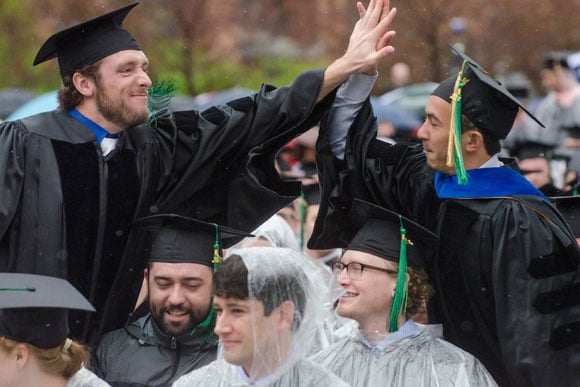 Graduates high-five at the CU Anschutz commencement ceremony.
Graduates high-five at the CU Anschutz commencement ceremony.
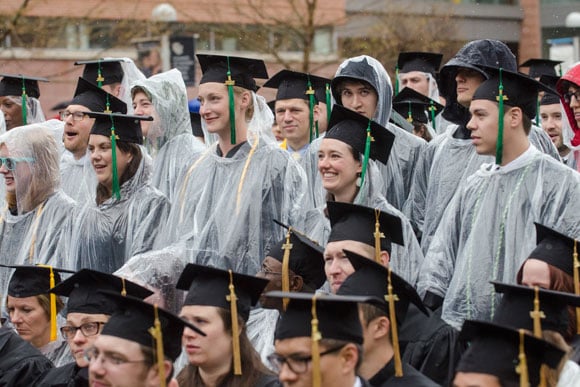 A little rain didn't dampen their spirits!
A little rain didn't dampen their spirits!
On Thursday, May 21, the Colorado School of Public Health held commencement on the Anschutz Medical Campus. More than 180 graduates and 500 attendees took part in the ceremony.
On Friday, May 22, inside a packed ballroom at Crowne Plaza, SOM Class Co-President Eric Petersen gave an entertaining speech, reminding his classmates to bring smiles to their patients and to always keep their next dream in sight. Petersen's dream is to become the first astronaut to perform surgery in space. "This goal pushed me to do my best," he said. "That's how we all got here: We dreamt of becoming physicians and today we realized that goal. But we're all intense type-A people, and our dreams don't just end there."
CU School of Medicine Dean and Vice Chancellor for Health Affairs John Reilly, MD, delivered his first commencement address as SOM dean. He recognized the Class of 1965 and retiring faculty and then offered a light-hearted admission. "I'm a little embarrassed to admit this is the first medical school graduation I've been to since my own 33 years ago," he said. "I did what any 21st century doctor would do to get ready for this: I went to YouTube to learn how to put on my hood."
Reilly told the graduates that the three most important words in their life are going to be "'I don't know.' ... Those words should be followed by 'I will find out.' But first be honest about the limits of your knowledge." He noted that "the science in medicine is exploding" and there are diseases that are being managed and cured today that weren't even discovered when he was in medical school. "As we reconfigure the health care system in the United States — if we do it the appropriate way — it will both be a better system for our patients and it will be a better system in which to practice medicine."
Here are profiles of just a few of our many talented graduates at CU Anschutz:
Ethan Rosenberg
Extended family.
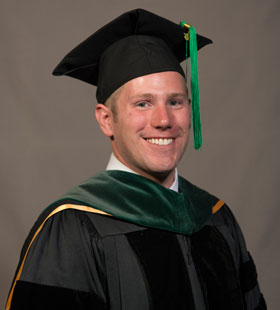 For Ethan Rosenberg, who just graduated from the University of Colorado School of Medicine (SOM), connections to the gold-and-black run deep. Both of his parents have taught in CU's SOM for 22 years, since moving from Charlotte, N.C., when Ethan was 7 years old. Also, Ethan's preceptor during medical school, Associate Professor Eric Sigel, MD, (pediatrics) was his family doctor while growing up, and Associate Professor Christine Gilroy, MD, (pediatrics) was a key mentor when he began thinking about a career in medicine.
For Ethan Rosenberg, who just graduated from the University of Colorado School of Medicine (SOM), connections to the gold-and-black run deep. Both of his parents have taught in CU's SOM for 22 years, since moving from Charlotte, N.C., when Ethan was 7 years old. Also, Ethan's preceptor during medical school, Associate Professor Eric Sigel, MD, (pediatrics) was his family doctor while growing up, and Associate Professor Christine Gilroy, MD, (pediatrics) was a key mentor when he began thinking about a career in medicine.
"(CU) always had this extended family feel ... Everything has been kind of this easy transition, and I really loved all the classes and all the rotations at the School of Medicine," Ethan says, noting that Associate Professor Julie Parsons, MD, and Assistant Professor Jennifer Armstrong-Wells, MD, (both in pediatrics-neurology) have also been medical school mentors. "And then when I went on and discovered child neurology (as a focal area). I've made great connections here with the residents and the faculty."
Having his parents close by was another plus, but there were times when Corry and Steven Rosenberg, both psychologists, felt they had to book a slot in Ethan's busy schedule—he also served on the Medical Student Council—just to see their youngest son. Only half-jokingly, Steven says, "One time I saw Ethan going into a building and I said, 'Hi, are you still going to school here?' And he said, 'Yeah, I am,' and I said, 'Give my regards to your parents.'"
'Really thrilled'
Steven Rosenberg, PhD, is an associate professor of psychiatry, while Cordelia "Corry" Robinson Rosenberg, PhD, RN, is a professor of pediatrics and psychiatry, and director of JFK Partners, a multidisciplinary clinic focused on training and research in developmental disabilities.
Corry said she and Steven were excited when Ethan, who received his undergraduate degree in physiology at CU-Boulder, told them he was accepted at the CU Anschutz Medical Campus. "It's just so difficult to get into medical school—there are just so many phenomenal applicants," she says. "So when he got in here we were really thrilled because he clearly wanted to study medicine so much."
Ethan originally planned to focus on adolescent medicine, but in year three of medical school he switched to child neurology. The blend of pediatrics and neurology intrigued him. "I guess I was always interested in neurology," he says. "It's not unreasonable to say that that has permeated from (my parents) through the years."
Ethan, who leaves in June for residency at Northwestern University in Chicago, plans to ultimately do clinical care while also pursuing some research projects. Like his parents, Ethan hopes to practice at an academic health center where he can also teach.
Steven says he's been "knocked out" by the caliber of students, including his son, at CU Anschutz. "I'm just so impressed by the students we teach," he says. "They're stellar. They're highly motivated, highly interested. They really care about doing well, and they really care about the patients."
'Good benchmark'
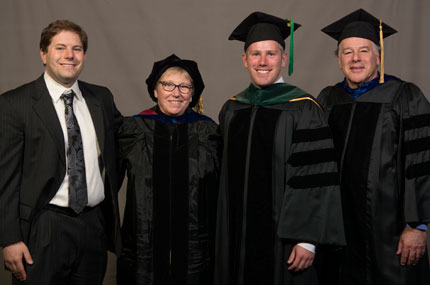 It's been a rewarding place to work as well, given the strong support the Rosenbergs have received from colleagues and department heads, Corry says. She will switch to part-time work in Pediatrics and Psychiatry at the end of June; Sandra Friedman, MD, MPH, will be the new director of JFK Partners.
It's been a rewarding place to work as well, given the strong support the Rosenbergs have received from colleagues and department heads, Corry says. She will switch to part-time work in Pediatrics and Psychiatry at the end of June; Sandra Friedman, MD, MPH, will be the new director of JFK Partners.
"This year seemed like a good benchmark," Cordelia says. "Ethan is graduating, and I'm turning 70. So, it seemed like good timing to slow down a bit."
The Rosenbergs watched their oldest child, Daniel, now with the Denver District Attorney's Office, graduate from CU-Boulder Law School 10 years ago. But for Ethan's commencement, Corry and Steven played an active role: They hooded their son with the doctoral regalia.
It's clear that the Rosenbergs blend more than a little humor into their professional lives of scholarship, law and patient care. Ethan gets a kick out of how mom and dad already have the next chapter of his life neatly mapped out: five-year residency, followed by marriage and children.
"They have a five-year plan for me that's a little bit clearer than I do for myself," he says with a chuckle.
Jose Hernandez
Jose Hernandez has seen health care disparities, and he wants to do his part to vanquish them. He watched his parents, both Spanish speakers who suffer from chronic conditions, receive inadequate care, often due to miscommunications between provider and patient.
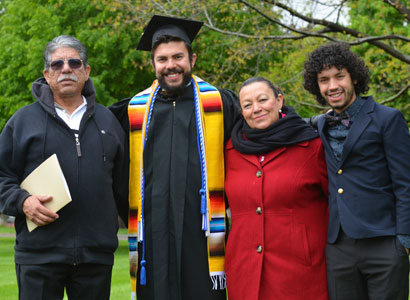 "If the goal of the medical community is to provide the best care possible for all patients, then it must strive for a more culturally competent system," Hernandez wrote in a scholarship-application essay. "... My life's mission as a health care provider is to educate and to demonstrate the healing powers that exist in patients' cultures and ethnicities."
"If the goal of the medical community is to provide the best care possible for all patients, then it must strive for a more culturally competent system," Hernandez wrote in a scholarship-application essay. "... My life's mission as a health care provider is to educate and to demonstrate the healing powers that exist in patients' cultures and ethnicities."
But Hernandez's interests reach far beyond the noble cause of delivering quality care to the underserved. He also loves international travel, playing trumpet and mentoring youth. He graduates this spring with a BS in nursing; Hernandez played the national anthem on his trumpet at the commencement ceremony.
'Unique part of health care'
It was at CU Denver, and then in the College of Nursing (CON) at CU Anschutz, that Hernandez, who struggled in high school, crystallized his life goals and flourished in both academics and extracurriculars. "I've always wanted to be in the medical field, primarily because I've always wanted to be a health care provider for my parents," he said.
But lacking academic role models—Hernandez is a first-generation college student in his family—he had no idea how to navigate college and pursue his ambitions. Enter TRiO Student Support Services at CU Denver as well as a key faculty mentor. TRiO helps first-generation, low-income students and students with disabilities achieve academic success.
Hernandez certainly has succeeded at college, graduating cum laude in biology at CU Denver before enrolling in CON's two-year bachelor's of nursing program.
He enrolled in the Undergraduate Pre-Health Program (UPP), which is offered through the Office of Inclusion and Outreach (OIO) at CU Anschutz. UPP allowed him to shadow a variety of medical professionals during a summer internship, and Hernandez found his niche in nursing, especially in OB-GYN. "One of the things I'm interested in is midwifery," he said. "It's a very unique part of health care to be taking care of women during this point in their lives. It was surprising to me because I didn't think that was going to spark me when I started this program."
Since summer 2013, Hernandez has worked in several roles at OIO. He especially enjoys serving as a role model, mentoring elementary, middle and high school students who, like him, come from low-income households and often view higher education as being out of reach. "I tell them what they need to do to go here," he said. "They enjoy a lot of the presentations I give because I really tailor them to the students' backgrounds. It's very effective outreach."
Hernandez hopes to combine clinical care with continued involvement in education. "Basically, underrepresented communities are in need of health care," he said. "Also, they're in need of educational initiatives about health care or about pursuing higher education."
'Now I'm hooked'
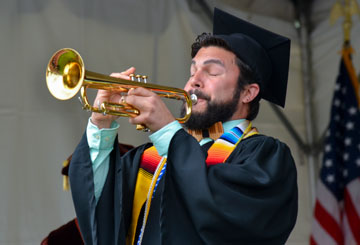 He plans to return to school, possibly to CON, to earn a doctorate in nursing. Meanwhile, he will add to his musical repertoire by studying jazz at CU-Boulder this fall. This summer, he will add stamps to his passport by traveling to India to study Hindi. He won a highly competitive Critical Language Scholarship, offered through the U.S. Department of State, to study abroad and learn another language (he grew up speaking two languages).
He plans to return to school, possibly to CON, to earn a doctorate in nursing. Meanwhile, he will add to his musical repertoire by studying jazz at CU-Boulder this fall. This summer, he will add stamps to his passport by traveling to India to study Hindi. He won a highly competitive Critical Language Scholarship, offered through the U.S. Department of State, to study abroad and learn another language (he grew up speaking two languages).
"That's another thing that the TRiO program got me into was traveling abroad," Hernandez said. "A lot of students are hesitant to do it as an undergrad, especially minority students. But I did it (studying abroad in Spain as a junior and Guatemala as a senior) and now I'm hooked."
If Hernandez has his way, plenty of folks from disadvantaged backgrounds will likewise get hooked on health care careers. "Reflecting upon my short career path, I have developed the fundamental belief that anybody is capable of higher education," he said. "There is no career that is too difficult to pursue or a disadvantage that is too great to overcome."
Sara Velotta
Duty. Honor. Pride.
Neither snow, nor rain, nor heat, nor gloom of night, nor the winds of change, nor a nation challenged, will stay us from the swift completion of our appointed rounds. Ever.
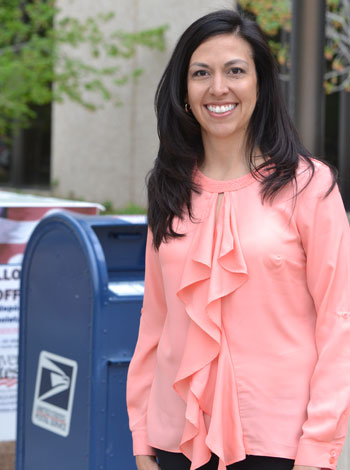 Sara Velotta is part of a legacy of postal workers. Her father, uncle and cousins are all life-long postal employees. It is a life Sara knows well. She even followed in her family’s footsteps.
Sara Velotta is part of a legacy of postal workers. Her father, uncle and cousins are all life-long postal employees. It is a life Sara knows well. She even followed in her family’s footsteps.
Starting with the United States Postal Service (USPS) at the age of 22, Sara soon moved up through the ranks. Within 13 years she was making an excellent living with little formal education. The work was varied, but physically demanding. “I had a high paying, blue collar job that was a job for life.”
Being a postal employee is an honorable career, but eventually Sara wanted more, especially after meeting her husband, Mike, who became a huge motivating factor. He went to school to become a physician assistant and after he completed the program he turned to Sara saying, “OK, now it’s your turn.”
Working full time for the post office while attending school (Front Range Community College and Metro State College), she had no preconceived notions of a career in pharmacy. “I loved my first biology class and knew I wanted to get in the medical field,” reminisces Sara. But people she encountered started exposing her to pharmacy as a potential career – her stepmother who is a pharmacist offered advice along the way and her husband helped set up shadowing sessions with pharmacists at Exempla. So, pharmacy became her dream.
“Throughout the experience, I had the encouragement of my co-workers. I couldn’t have done it without the postmaster believing in me.” After sharing her vision of becoming a pharmacist with her postmaster, she was allowed a flexible schedule at work to complete her prerequisites and was accepted to CU’s pharmacy program, just shy of receiving her bachelor’s degree.
“During my P-1 year, the (Skaggs School of Pharmacy and Pharmaceutical Sciences) introduced a new program for those of us who had not earned a bachelor’s degree prior to entering pharmacy school. It enabled me to earn a Bachelor of Medical Science degree concurrent with my doctorate.”
After that first year, she made the decision to resign from her job with USPS. “It was the right time as I needed to get experience in the field of pharmacy.” So, she walked away from a sure thing – a steady job, good pay and a government retirement. “I did something most people don’t do. I left job security behind. It was both intimidating and liberating.”
But according to Sara, “security isn’t everything. And as the saying goes, ‘we only regret the chances we don’t take.’” With a positive outlook and a job with Walmart, Sara has no regrets.
